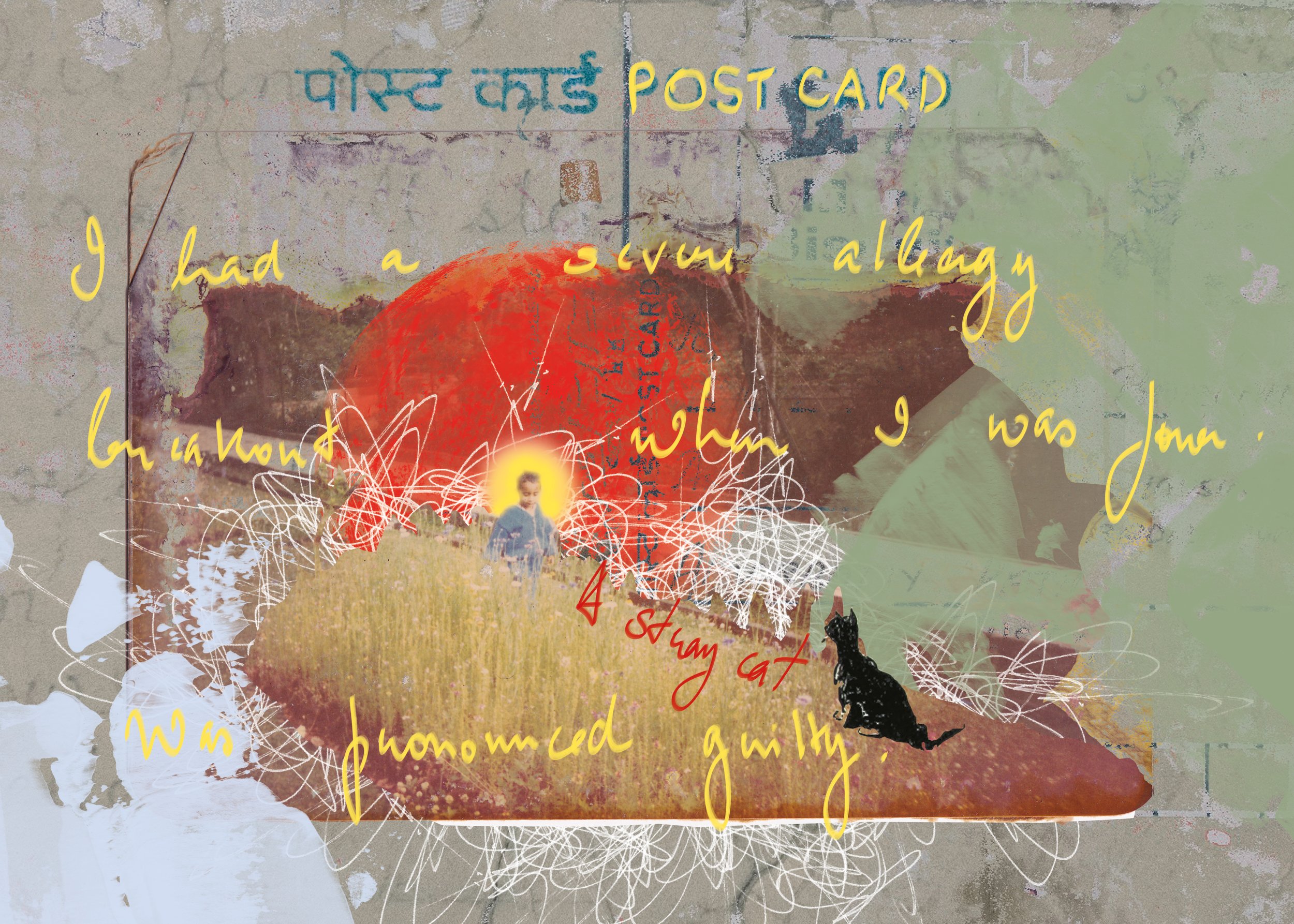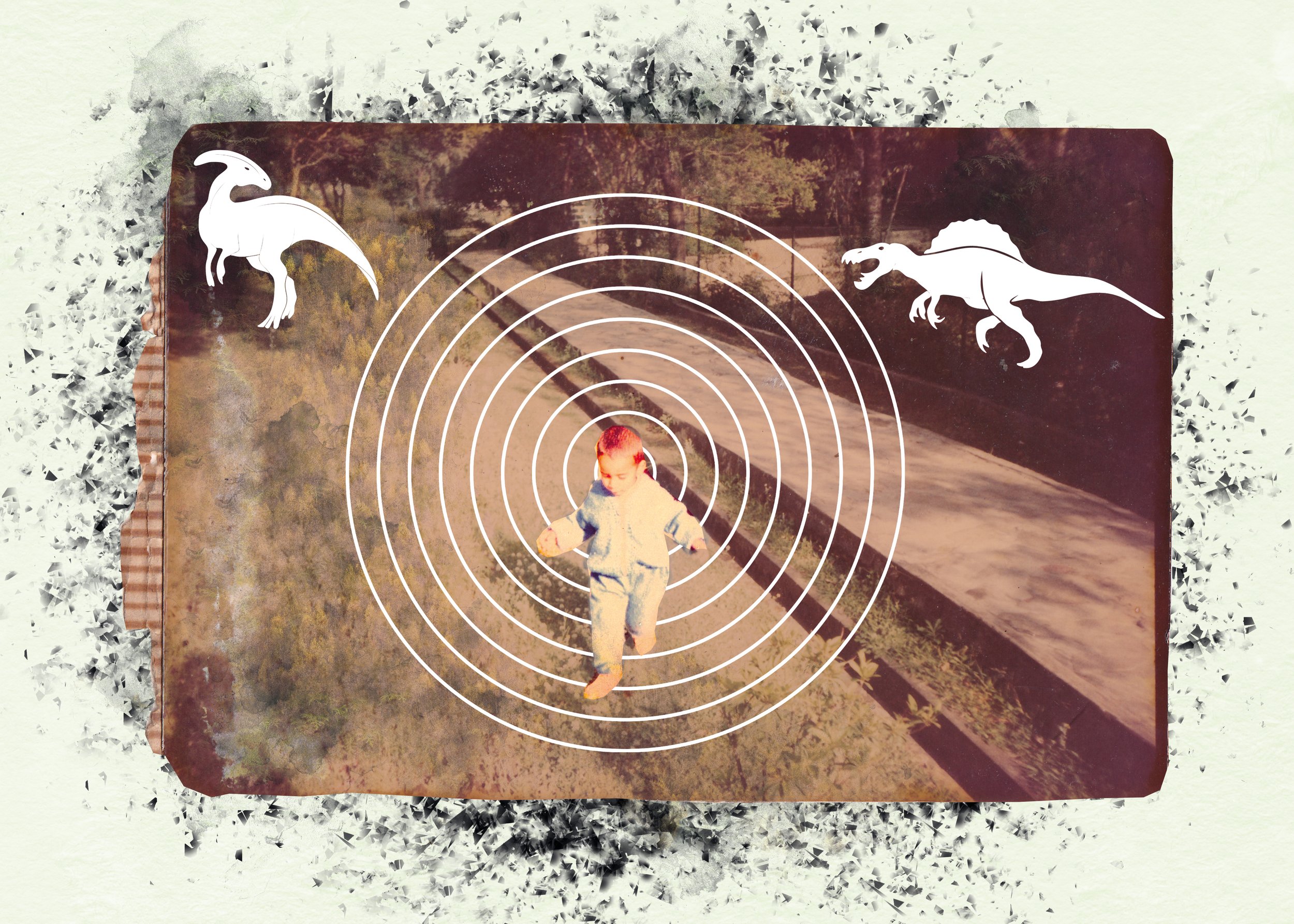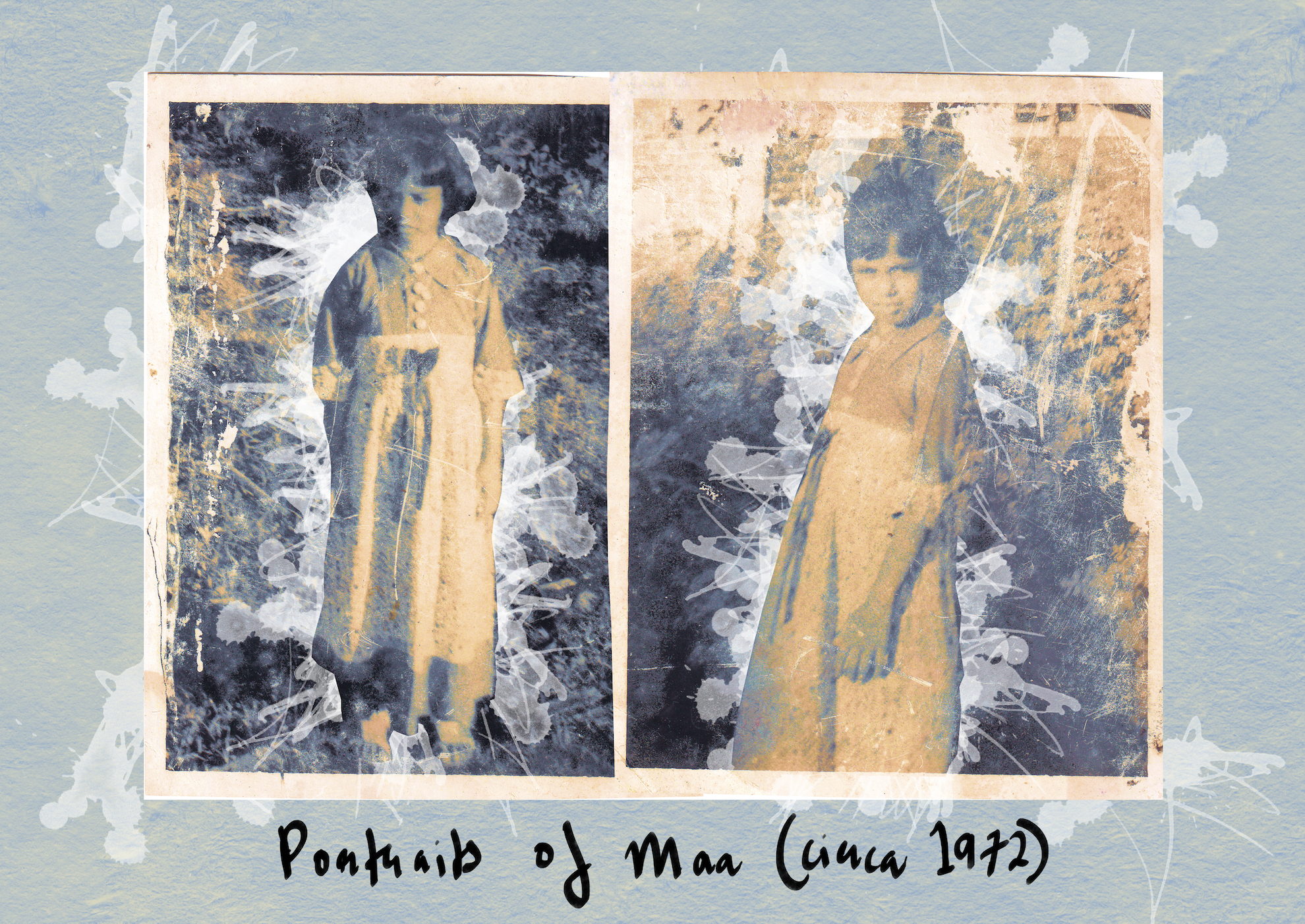MEMORIES OF DINOSAURS
Brishbanu Baruah ©
On the rather bright winter afternoon of November 14, 2015, my father's skull cracked open— the sound echoed through the air as his brain spilled out onto the funeral pyre. The wind gently steered the heat towards me, singeing the hair on my shin. Stepping back, I looked intently at his evaporating body, realizing that the only residue left was a collection of images and shadows that I would carry for a lifetime. Yet, as I absorbed the last image of his being— a few bone shards—I felt a strange lightness.
The news of his death reached my mother at six in the morning, pushing her from sleep to tears. We were still in bed, half-asleep, wrapped up tightly under our blankets when the phone rang. It was an unfamiliar call, as the first few seconds were of introduction from the person on the other end. And then, the tears poured out. Despite their acrimonious divorce over 15 years ago, she confessed between sobs, "Nothing changes the fact that I was in love with him once."
Brishbanu Baruah ©
The Sun had already travelled halfway up through the window in the bathroom. I looked at my reflection in the mirror—my eyes weighing heavy from sleep crust, a congestion in my nose, dehydrated mouth—and for a moment I saw two, or maybe three of myself staring back. I splashed the numbness out with cold water, and floated out into the street.
A man pulled up by the curb on his scooter. Two young children—a boy, who was probably 4, and a girl, a few years older—jumped out from behind. The girl rushed onto the raised sidewalk where a few more school kids were waiting for the bus with their parents. The man hoisted the boy up by his comically large school bag that left everyone in splits. The boy tottered a few steps after being put down, and before he could regain his composure, the school bus arrived. He was hoisted up in the air yet again, and safely deposited inside the school bus.
I stood there for a moment and tried to recollect memories of my father dropping me at school. I just had one—of emerging from a vintage, red Volkwagen Beetle that he’d bought from an antique car collector. He had returned from England after playing 2nd Division County, and found himself with a decent amount of disposable income. Despite the fact that his family required financial security his first act was to give in to his impulses. “He travelled twelve hours to buy the car and then drove it back home!” Maa exclaimed when I brought it up later.
Brishbanu Baruah ©
The school bus left while I stood there lost in my thoughts. The man took a casual look at fish being sold by the sidewalk, and then promptly disappeared beyond the bend. The sidewalk suddenly felt empty. I took a deep breath and remembered the lines from a poem I wrote not long before that morning:
When I was a child
they made us kneel down
in front of a statue of the Son,
his eyes weighed down
by the shadow of his Father.
And I stared straight
at the telephone—
the far end of the room
willing it to ring, to come alive
with my mother’s voice
that I carry in my ears.
As I walked back home to calls from people I didn’t talk to, giving me condolences, I didn’t need, I caught sight of a tiny, plastic dinosaur atop the refrigerator—a Brachiosaurus.
Brishbanu Baruah ©
Maa had been diagnosed with tuberculosis a month after my birth. This medical episode left her vulnerable to persistent bouts of asthma that continued well until I was in kindergarten. Or maybe older. What I do remember is that she undertook a medical trip to Hyderabad—the city boasted of an unusual treatment for asthma that included swallowing a live fish coated with indigenous medicine. Anyway, she left me in the care of my father for two weeks. I spent much of the two weeks waiting for him to arrive home after office, but I seldom saw him until the next morning at breakfast. During breakfast he’d put on a VHS copy of Jurassic Park to keep me from chattering while he nursed his hangover (something I understood retrospectively). In spite of his efforts, I’d still nudge him about his knowledge of dinosaurs.
“Oh! They’re huge! We have the long-necked one as a pet!” he’d claim. “They don’t like children who talk while eating. Do you want me to tell him that you’re talking a lot!”
Did that work? I don’t remember. But after the first few days of waiting for him to come back home, I found a new pastime—I wanted to find the long-necked dinosaur that was our pet, and who strangely, managed to stay hidden inside our rather small compound. I shoveled through sand that was being used for house renovation, I scraped my knees on bricks, and pricked my fingers one too many times with wooden splinters, only to end up scaring my grandfather’s two cats and waking up the old, mangy mutt who was always unbothered with my presence.
Brishbanu Baruah ©
“What are you up to, Bhomboul?*” my grandfather would ask sometimes, looking up from behind the newspaper always planted over his face. But I would already be halfway down the house on my toy car, searching for the dinosaur. I don’t remember when I finally gave up, but a day before Maa came back home, my father took me out to the zoo with another woman. Did he feel bad for not being there and decided to take me to the zoo? Did he ask the woman to accompany us as an afterthought? Or was it an excuse for an outing with the woman? Honestly, I don’t know, and to a certain extent, I don’t care.
At the zoo, he raced me to a certain enclosure and then asked me to look up. Two giraffes looked on at the crowd of visitors gathered to look at them. “There’s the dinosaur I was talking about.” He picked me up and pointed at one of them, “See how huge it is! That’s why we had to give it to the zoo.”
I was seven. I knew the multiplication table until 5, how to tie my shoe laces, read the illustrated Grimm’s Fairy Tales, ride my bicycle without falling, and above all, name a dozen animals after waking up from deep sleep. “It’s a giraffe.” I must have said, or not. However, I did realize that he’d never seen any dinosaurs let alone have one as a pet.
Brishbanu Baruah ©
I dreamt of swans
whom I carried, to watch
children play football
in a field of snakes.
Then they bit my armflailed their wings, and
flew away to eat the Sun,
while the Giraffes watched.
“When was the last time you saw him?” my father’s youngest sister asked, holding me in a tight embrace as we entered his house. “Go, take a look at him! This is the last time!” she added further. It was a two-storey building- a kilometer away from the capital- designed for comfort. Three playful mutts circled around the spacious living room excited at the sight of a crowd tensing around like electrons. And then, from the room at the farthest corner, his widow- from his third and final marriage- rushed out wailing and embraced Maa; then me. That was our first meeting.
A week before he died, he’d passed by our house, slowing down his white SUV, to wave at us. It was Maa who’d noticed him; I was scrolling my phone while sipping tea. I only caught sight of his arm loosening up against the door as he sped off. Afterwards we sat in silence distracting ourselves with the internet.
Brishbanu Baruah ©
Brishbanu Baruah ©
Brishbanu Baruah ©
The room where his dead body was placed smelt of fresh paint— his sudden demise put a halt on the wide scale renovation. However, I could still recognize the wall outside the window- patches of moss still remained; although the snails that used to crawl on it, terrifying me as a child, were gone. I remembered how out of boredom and curiosity I’d once ripped off the arm of a G.I. Joe, and flung at one of them. Rigor mortis had rendered my father’s arms with the same tactility. For a moment I wondered if it’d be as easy to rip them off and wave at all the descending ghosts.
Someone asked me to touch and pray at his feet. I did, much less out of respect; rather I remembered them vividly: I was sent off to a boarding school in Darjeeling in the wake of their impending divorce. It was a tiny school that stood on a slope. A huge iron gate with a sliver a few inches off the ground opened into a large stairway that descended fifty feet. If one stood- a child- on the fourth step, they’d be at eye level of the sliver beyond which lay the road that in our hearts represented liberation, but most of all, the passage home. The second year of boarding, he’d paid me a visit. I was nine, and hadn’t seen him in over two years.
The last image I’d of him, then, were his arms seizing Maa’s neck while two of my grandfather’s security guards tried to pry him off. We left his house immediately escorted by the guards, crying, walking a distance of two kilometers to my maternal grandma’s house at 2 in the night. In contrast, he sat placidly in the school office holding my arms gently. Maybe it was the smell of incense, or the bowed down statue of Jesus behind him, but he was a quiet man for all of five minutes. Later when he left, I stood on the stairs and watched his white sneakers contemplate the ground, before the feet of a woman appeared from round the bend and disturbed the stillness.
“He loved you a lot!” his widow said as we sat down in the evening after the funeral. “He’d cried a few days before thinking about you; he wanted to apologize.” One of the mutts looked at me from under the table while I sipped tea. “I’m sorry we couldn’t save the rest. He must have left the cigarette burning when he’d passed out one of the nights. Thankfully we could douse the fire immediately!” She said as she handed me a white envelope, before walking off to attend the rest of the family.
Eleven burnt photographs slipped out— a portrait of our relationship.
Brishbanu Baruah ©
*Bhomboul: Bumble Bee (in Assamese). My grandfather kept this as my nickname since I’d be constantly inquisitive.
ABOUT THE AUTHOR
Brishbhanu Baruah is a multidisciplinary artist whose practice spans video, photography, sound, and text. He studied Film Direction in FTII, Pune, and his artistic endeavors are characterized by an engagement with digital photographic processes, documentary methodologies, and sensorial ethnography. His work explores memory, time, mortality, and individual experiences.
You can check his work out on https://www.behance.net/brishb, or his Instagram account @beedaney











